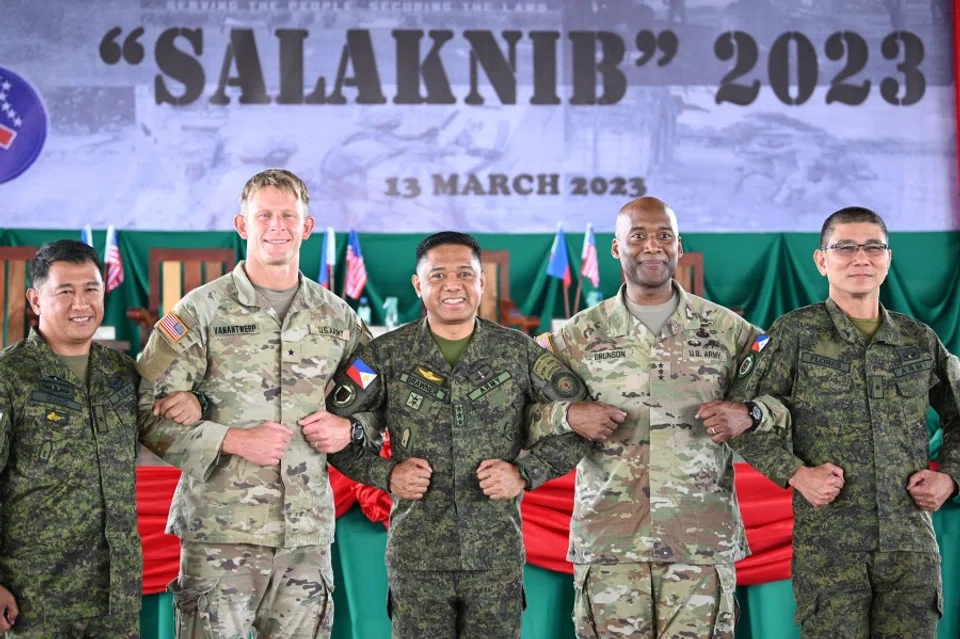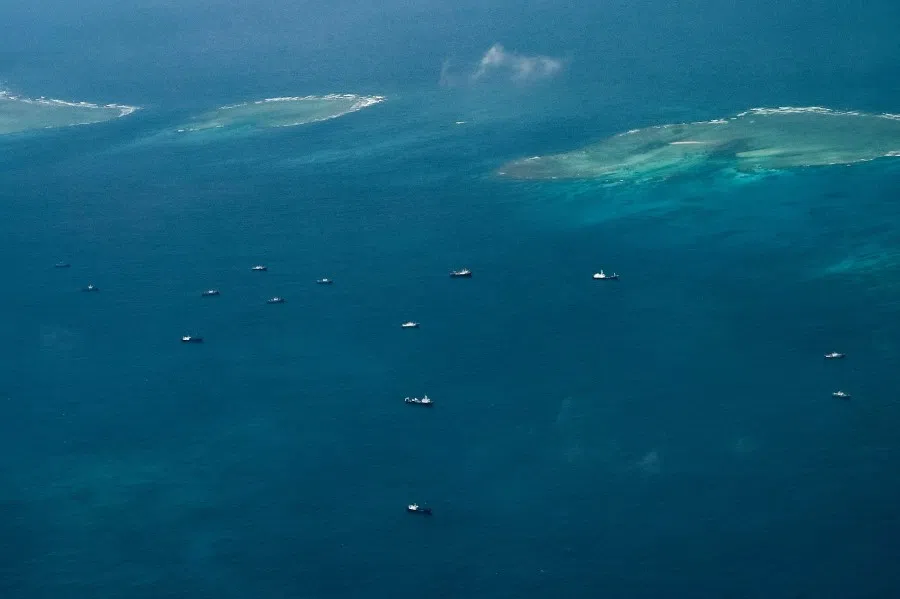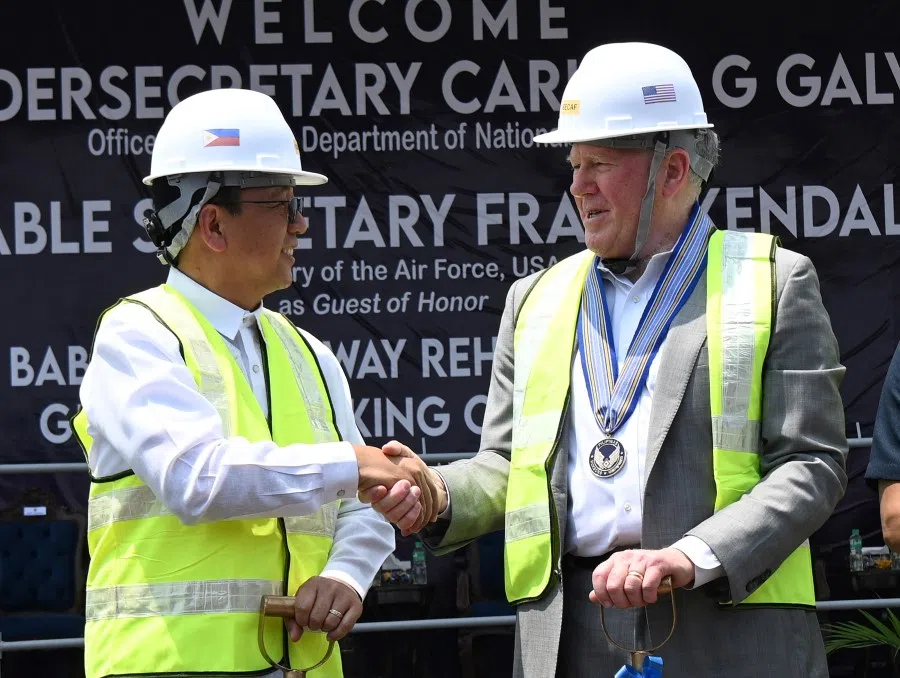Is Philippine President Marcos Jr swinging too far back to the US?
The Marcos Jr administration's defence cooperation policy that hews closer to the US is facing domestic criticism, even from his sister. China is also growing increasingly uncomfortable with recent moves between the Philippines and the US, and posturing that suggests that the Philippines could be enlisted to part of the "China containment club".

In a month, the Philippines went through some foreign policy highs and lows that made for interesting television. On 1 March 2023, Imee Marcos, President Marcos Jr's sister and chair of the Senate Foreign Relations Committee, grilled the defence and foreign affairs chiefs on the four new sites under the US-Philippine Enhanced Defence Cooperation Agreement (EDCA) announced on 1 February.
Many commentators celebrated President Marcos Jr's "strategic reboot" with the US, suggesting that this indicated the Philippines' potential participation in the defence of Taiwan and an anti-China "Quad" with Japan and Australia. However, that the president and his close advisers thought out loud about a Reciprocal Access Agreement with Japan and "Quad" patrols in the South China Sea (SCS) exacerbated concerns by both the opposition and his own allies that Marcos Jr is swinging too far back to the US.
Imee Marcos' hearing was a powerful reminder of how much Manila's political environment has changed in recent years.
She [Imee Marcos] pressed officials on why the proposed EDCA sites are in Cagayan, Isabela, and Zambales - all in Northern Luzon and facing Taiwan...
EDCA sites in question
First, China's business footprint in the Philippines has expanded, creating a strong lobby keen on side-stepping geopolitical and territorial disputes. Imee Marcos shared that the governors of two of the three provinces suggested as hosts for the new EDCA sites were hesitant to do so.
She pressed officials on why the proposed EDCA sites are in Cagayan, Isabela, and Zambales - all in Northern Luzon and facing Taiwan - rather than the more logical West Philippine Sea, where the country faces immediate territorial incursions from China.
The Department of Foreign Affairs (DFA) and the Department of National Defence (DND) repeatedly spoke of the EDCA as addressing humanitarian assistance and disaster response, which made for a weak rationale and made Marcos Jr's EDCA plan appear dishonest.
Philippines a lily pad for American troops?
Second, the administration allowed the messaging to go in different directions. The Philippines has not committed to supporting the defence of Taiwan. Yet much of the expert and media commentary has framed Marcos Jr's latest actions as essentially making the Philippines a lily pad for American troops' forward posture in Asia.
This raised eyebrows among senators: the majority - some of whom are still affiliated with the Dutertes - expressed scepticism about US intentions, while a minority raised the longstanding issue of the Philippine Left against potential negative impacts of foreign troop presence on local communities.
...the national security establishment does not treat the defence of Taiwan as a core national security interest; their immediate concern is improving deterrent measures for future SCS territorial disputes.

Third, Philippine-US interests diverge more substantially than many realise. A recently concluded 2022 iteration of a survey of Filipino military personnel and bureaucrats found that the national security establishment does not treat the defence of Taiwan as a core national security interest; their immediate concern is improving deterrent measures for future SCS territorial disputes.
While a vast majority of Filipinos are overwhelmingly critical of Chinese actions in the SCS, Marcos Jr sees the need to compartmentalise these disputes and to ensure that cooperation with the US is enhanced but delimited. In contrast, defence cooperation statements of the US, Australia, and Japan - such as speaking of EDCA in terms of a Taiwan contingency - seem to enlist the Philippines as part of a broader "China containment club".
This approach, which might have worked under Benigno Aquino III, ignores the considerable opposition by politicians and businesses to the factional alignment that was championed by former president Rodrigo Duterte. Overshadowed by the threat of broader conflicts, the specific operational-level objective of military facilities hardening under EDCA is not being debated on its own terms.
The US's apparent treatment of Marcos Jr as a reset for US-Philippine relations, therefore, impairs the long-term robustness of the bilateral security partnership for short-term gains.
Long-term interests or short-term gains
The US's apparent treatment of Marcos Jr as a reset for US-Philippine relations, therefore, impairs the long-term robustness of the bilateral security partnership for short-term gains. Marcos Jr's presidency rests on a coalition with the Dutertes who are more sympathetic towards Beijing. This can come back to haunt the US after the next Filipino presidential race in 2028, where Sara Duterte will be the strongest contender.
To be sure, even with the four additional sites, EDCA is not a return to the scale of the pre-1992 American military setting up bases in the Philippines. It is more aptly described as a form of "flexible enmeshment".
The DND and DFA can do better to articulate the rationale behind Marcos's defence cooperation policy and why it is not merely a repeat of former president Benigno Aquino III's openly confrontational China policy between 2012-2016 - which Marcos Jr's team fails to emphasise.

Putting limits to both US and Chinese actions
More contour-definition by DND and DFA would help, such as emphasising EDCA's limited purpose, firming up criteria for site selection, and explicitly addressing how the deal is not simply about humanitarian assistance. The point is to emphasise the purposiveness of the activities, not a general uptick in cooperation whose very ambiguity is unnerving China.
Filipino defence officials should provide counter-arguments against sceptics of engagement with the US. China's territorial incursions are a concern near the Benham Rise in the northeast and Sibutu Passage in the south. Some senators' demands that military force projection should occur only in one part of the country is "fighting the last war", so to speak, by refusing to acknowledge the changing threat environment. Additionally, EDCA requires mutual agreement on how rotational forces act, which helps the Philippines to limit the kinetic consequences of any foreign troop presence.
The Philippines cannot put the genie back in the bottle - neither former President Rodrigo Duterte's valid wariness of the US nor Benigno Aquino III's principled defiance against China to protect Filipino sovereignty.
Strategically, China has further pushed out Filipino fishermen from fishing grounds and continued dangerous manoeuvres like lasering Filipino maritime law enforcers. Any Filipino president's defence policy must be able to provide adequate operational responses to these challenges. Filipinos arguing for more cordiality with China as a foreign policy goal have fallen short. After all, showing resolve against China has been a recurring topic in recent elections.
Ultimately, the Philippine security establishment is duty-bound to respond to operational threats, so it cannot avoid taking calculated risks to improve the country's force posture. The Philippines cannot put the genie back in the bottle - neither former President Rodrigo Duterte's valid wariness of the US nor Benigno Aquino III's principled defiance against China to protect Filipino sovereignty. Any sustainable defence engagement policy under the new president must reconcile both realities.
This article was first published by ISEAS - Yusof Ishak Institute as a Fulcrum article.
Related: Chinese academic: The Philippines' closer ties with US could cross China's bottom line | It's hard for the Philippines to stay neutral in a Taiwan contingency | Can the Philippines stay neutral in a Taiwan Strait military confrontation between the US and China? | The China factor and 'Bongbong' Marcos's foreign policy | Closer trilateral US-Japan-Philippines ties to protect security interests against China



![[Big read] When the Arctic opens, what happens to Singapore?](https://cassette.sphdigital.com.sg/image/thinkchina/da65edebca34645c711c55e83e9877109b3c53847ebb1305573974651df1d13a)
![[Video] George Yeo: America’s deep pain — and why China won’t colonise](https://cassette.sphdigital.com.sg/image/thinkchina/15083e45d96c12390bdea6af2daf19fd9fcd875aa44a0f92796f34e3dad561cc)
